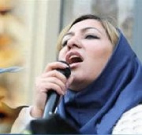Right to Education – Distortion & Disinformation
We have made arrangements so that no applicants would face any problems with star markings or any other moarkings, which might show a conditional selection, and so that examination applicants know their situation before the results are announced.120
– Abdolrasool Pourabbas, head of testing for the Ministry of Education, 1 March 2007
The claim about expelling of some of these students is… Limitations against some of these Baha’i university students have nothing to do with their religious beliefs. This limitation is because they have failed to meet the entrance requirements to the university and the fact that they have been members of an illegal cult with anti-Human Rights activities.121
– Seyed Ali Raeis Sadati during Iran’s UPR, 15 February 2010

Puyan Mahmoudian, received the sixth highest score on graduate entrance exams in polymer chemical engineering, but was barred from continuing his education due to his activities and being critical of the government.
During the past five years, hundreds of students have been barred from higher education in Iran. Authorities tasked with managing the country’s institutions of higher education, flag the academic records of student activists and government critics, as well as students of the Baha’i Faith, barring applicants from gaining admission to bachelor degree programs or from continuing their education in graduate programs.122
The Campaign interviewed 27 students barred from higher education and compiled a list of 217 students. The true numbers are believed to be much higher, as many targeted students have preferred not to make their case public, fearing further persecution, or hoping that they can reverse their education bans by giving written guarantees to cease their activism.123
Excluding these students from higher education has had nothing to do with academic performance or rankings in highly competitive entrance university examinations. Indeed, in all cases reviewed by the Campaign, students ranked high enough on entrance exams to gain admissions. Nonetheless these students, including some of the best and brightest in Iran, faced systematic, politically and religiously motivated discrimination and exclusion.124

Student activist and member of the Council for the Defense of the Right to Education, Mahdieh Golroo who was barred from education in 2007 as a result of her student and civic activities.
Two regulations issued by the Supreme Cultural Revolution Council: the Moral Selection Regulations for University Entrance Applicants, adopted in 1987, and the Student Selection Criteria, adopted in 1988, require that the national university selection committee to gain approval for student admissions from non-academic government organs, including the Ministry of Intelligence and the Prosecutor of the General and Revolutionary Courts.125 These agencies can block, or make conditional, an applicant’s admission irrespective of his or her performance on standardized examinations or academic merits.
Under the regulations, authorities can reject a university applicant if they are “reputed to be morally corrupt,” “enemies” of the Islamic Republic or do not belong to “Islam or other recognized religions (i.e. Christianity, Judaism, and Zoroastrianism).”126
——
Back to Main
————————————————————




